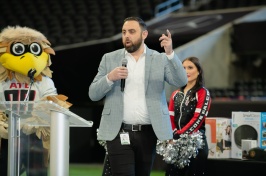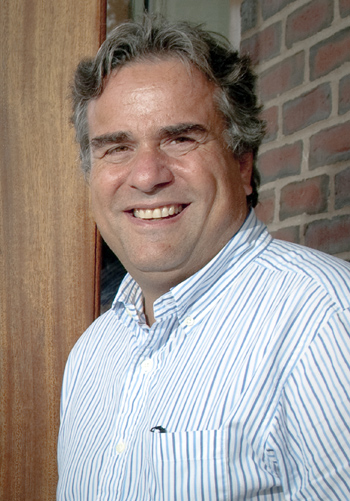|
Michael Goldberg, the Roland H. O'Neal Professor at the UNH Whittemore School of Business and Economics. |
Groundbreaking research conducted by Michael Goldberg, the Roland H. O’Neal Professor of Economics at the University of New Hampshire Whittemore School of Business and Economics, has led to the creation of an international research center at the University of Copenhagen that is part of a comprehensive initiative of the Institute of New Economic Thinking (INET), founded by financier and philanthropist George Soros.
The INET Program on Imperfect Knowledge Economics was launched earlier this month at the institute’s annual plenary conference in Berlin. One of the main research programs of the institute, the initiative and its corresponding research center, the INET Center on Imperfect Knowledge Economics (IKE), is based on the theory developed by Goldberg and his colleague Roman Frydman, professor of economics at New York University.
"IKE represents a paradigm shift in our thinking about economics. Professors Goldberg and Frydman have done work that is already having a major impact on the field. By showing how formal economic theory can recognize the fact that market behavior does not unfold mechanically, IKE will forever change future economic research and practice. This is really groundbreaking research," said Dan Innis, dean of the UNH Whittemore School of Business and Economics.
Goldberg will serve as a senior research associate of the INET Program on Imperfect Knowledge Economics. Frydman will chair the program. Katarina Juselius, professor of economics at the University of Copenhagen, will direct the INET Center on Imperfect Knowledge Economics. For years, Goldberg and Frydman have been collaborating with researchers at the University of Copenhagen, which has become widely known for pioneering and developing an alternative econometric methodology.
“The work that’s taking place in Copenhagen, New York, and New Hampshire is an important example of the kind of new economic thinking that INET was formed to inspire and support. IKE’s examination of nonroutine change is important to our understanding of financial systems, innovation, and the designs that foster the wellbeing of society,” said Robert Johnson, INET executive director.
Posing a major challenge to economic orthodoxy, the IKE theory asserts that exact models of purposeful human behavior are beyond the reach of economic analysis. Goldberg and Frydman argue that the longstanding empirical failures of conventional economic models stem from their futile efforts to make exact predictions about the consequences of rational, self-interested behavior. Such predictions disregard the importance of individual creativity and unforeseeable sociopolitical change, thus usually failing to predict how markets behave.
Goldberg and Frydman first presented the IKE theory in 2007 their landmark book “Imperfect Knowledge Economics.”
“Economists mistakenly believe that they have found the way to specify how ‘rational’ individuals are supposed to behave. As a result, the failure of their models to explain fluctuations in asset markets leads them to conclude that participants in these markets are ‘irrational’ and that fundamentals such as interest rates and income growth, do not matter. But we argue that there is a much more plausible interpretation: conventional economic models are just the wrong theory of how rational individuals behave and how fundamentals matter,” Goldberg said.
IKE rejects exact quantitative predictions of individual decisions and market outcomes in favor of mathematical models that generate only qualitative predictions of economic change. The economists provide a nontechnical explanation of the reasons why economists’ ideas are so often flawed and how contemporary macroeconomic and finance theory made the recent global financial crisis more likely, if not inevitable, in their 2011 book, “Beyond Mechanical Markets.”
Launched in October 2009 with a $50 million commitment from George Soros and
driven by the global financial crisis, the Institute for New Economic Thinking (INET) is dedicated to empowering and supporting the next generation of economists and scholars in related fields through research grants, task force groups, academic partnerships, and conferences. INET embraces the professional responsibility to think beyond current paradigms. Ultimately, INET is committed to broadening and accelerating the development of innovative thinking that can lead to insights into and solutions for the great challenges of the 21st century and return economics to its core mission of guiding and protecting society. For more information, visit http://www.ineteconomics.org/.
The UNH Whittemore School of Business and Economics offers a full complement of high-quality programs in business, economics, accounting, finance, information systems management, marketing, and hospitality management. Programs are offered at the undergraduate, graduate, and executive development levels. The school is accredited by the Association to Advance Collegiate Schools of Business, the premier accrediting agency for business schools worldwide. In January 2013, the business school will move into its new state-of-the-art facility and become the Peter T. Paul College of Business and Economics.
The University of New Hampshire, founded in 1866, is a world-class public research university with the feel of a New England liberal arts college. A land, sea, and space-grant university, UNH is the state's flagship public institution, enrolling 12,200 undergraduate and 2,300 graduate students.
VIDEO
Michael Goldberg, Roland H. O'Neal Professor at the UNH Whittemore School of Business and Economics, discusses IKE during the breakout panel discussion "Instability in Financial Markets: Sources and Remedies" at the Institute for New Economic Thinking's (INET) Paradigm Lost Conference in Berlin, April 14, 2012.
http://www.youtube.com/watch?v=cf86hazc_pA
Originally published by:
UNH Media Relations


















































